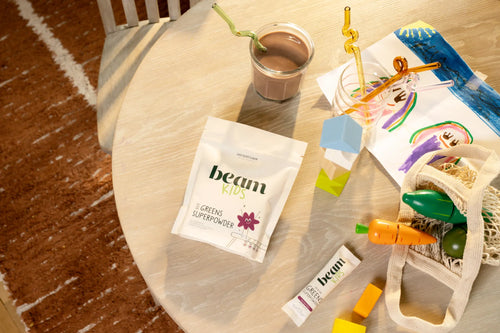Best Vitamins for Kids Guide for Parents
Did you know that about 1 in 3 children don’t get enough essential nutrients from their daily meals? Between busy schedules, picky eating, and changing appetites, many parents struggle to make sure their kids get all the vitamins and minerals needed for healthy growth. The good news is that small, consistent habits combined with the right vitamin supplements when needed can make a big difference in your child’s energy, development, and immunity.
The best supplement for child growth usually contains a mix of vitamin D for strong bones, vitamin A for healthy vision, vitamin C for immunity, vitamin E for cell protection, and B vitamins for energy. Iron supports brain development and helps create red blood cells, while calcium builds strong bones and teeth. Pediatricians often recommend starting with a well-rounded children’s greens or multivitamin designed for your child’s age group and free from artificial flavors or excessive sugar.
Do Kids Really Need Vitamin Supplements?
Kids would get all their nutrients from food. But in reality, even healthy eaters can fall short. Studies show that most children, even those eating relatively well, often lack key nutrients like vitamin D and iron.
Children who eat from all food groups, such as fruits, vegetables, whole grains, dairy products, and lean meats, usually get enough nutrients naturally. The American Academy of Pediatrics notes that healthy kids with a balanced diet generally don’t need extra supplements. Still, there are exceptions:
- Kids with restricted diets (vegan, vegetarian, or allergy-based)
- Picky eaters who reject entire food categories
- Children with digestive issues or nutrient absorption problems (like celiac disease)
- Kids going through growth spurts or who have higher nutrient needs due to activity levels
For these groups, a vitamin and mineral supplement can help bridge the gap until eating habits improve.
Signs Your Child May Need Extra Vitamins
Every child’s needs are different, but these signs may suggest nutrient deficiencies:
- Frequent colds or slow recovery from illness
- Fatigue, poor focus, or irritability
- Pale skin or brittle nails (possible iron deficiency)
- Dry skin or dull hair (may point to a vitamin A or E deficiency)
If you notice these symptoms, talk to your board-certified pediatrician. They can evaluate your child’s growth charts, diet, and possibly recommend testing before suggesting supplements.
The Best Vitamins for Kids and What They Do
Each vitamin plays a unique role in your child’s physical development, immunity, and daily energy. Here’s a simple breakdown of the most important ones and how they help.
Vitamin A for Healthy Vision
It supports healthy vision, skin, and immune function. It’s naturally found in colorful foods like sweet potatoes, carrots, spinach, eggs, and dairy products. Vitamin A helps keep your child’s eyes strong and their immune system ready to fight infections. Children who don’t eat enough vegetables rich in color may fall short, so vitamin and mineral supplements can be a helpful backup when needed.
Vitamin C for Immune System Support
Vitamin C boosts immunity, helps the body heal, and improves iron absorption. You’ll find it in citrus fruits, strawberries, tomatoes, and bell peppers. This essential vitamin strengthens red blood cells and helps prevent infections. Because many picky eaters tend to skip fruits and vegetables, vitamin C is one of the most common nutrients they miss out on.
Vitamin D for Strong Bones
It plays a major role in building strong bones and teeth by helping the body absorb calcium. It comes from sunlight, fortified dairy products, fatty fish, and eggs. Since many kids spend more time indoors or don’t drink enough milk, vitamin D deficiency is fairly common. In those cases, a vitamin D supplement or fortified food may be recommended by your pediatrician to support bone and immune health.
Vitamin E for Cell Protection
It protects cells from damage and supports a healthy immune system. It’s found in nuts, seeds, spinach, and vegetable oils. Acting as a natural antioxidant, it helps protect growing cells and maintain healthy skin. Because vitamin E is a fat-soluble vitamin, kids who avoid healthy fats like nuts or avocados might benefit from small supplemental amounts to stay balanced.
Other Essential Nutrients for Growing Kids
While the big four (A, C, D, and E) get most of the attention, B vitamins and minerals like iron, calcium, and zinc also play vital roles in child growth and cognitive development.
- B vitamins help convert food into energy and support mental health and brain function.
- Iron prevents iron deficiency and builds red blood cells that carry oxygen through the body.
- Calcium and vitamin D work together for strong bones and teeth.
- Zinc helps repair tissues and strengthens the immune system.
Choosing the Best Supplement for Child Growth
When choosing a supplement, aim for quality, safety, and simplicity. The best supplement for child growth provides essential nutrients without artificial flavors, added sugar, or common allergens.
Here’s what to look for:
- Clearly labeled ingredients and recommended dosage.
- No artificial colors or sweeteners.
- Certified organic or third-party tested for safety.
- Designed for your child’s age group.
Gummy vitamins are popular because kids enjoy them, but keep in mind that not all gummies are equal—some contain added sugar or sticky ingredients that may affect dental health. Alternatives like powder or liquid supplements can be easier for parents who prefer cleaner options.
Fat-Soluble vs. Water-Soluble Vitamins
Vitamins A, D, E, and K are fat-soluble vitamins, meaning they are stored in the body. Too much of these can cause toxicity if overused, so stick to recommended doses. In contrast, B vitamins and vitamin C are water-soluble, meaning the body flushes out any excess. That’s why consistency matters more than large doses.
Building a Healthy Diet Without Relying on Supplements
Even the best vitamins for kids can’t replace real food. A well-balanced diet gives your child not only vitamins but also fiber, antioxidants, and beneficial compounds that supplements can’t replicate.
- Half the plate: fruits and vegetables (for vitamins A, C, K, and folate)
- One quarter: whole grains (for B vitamins and iron)
- One quarter: protein sources (for amino acids, iron, and zinc)
- Plus: dairy or fortified alternatives for vitamin D and calcium
If your child has dietary restrictions or multiple food allergies, work with a pediatric dietitian to ensure proper nutrient coverage.
How Whole Foods and Supplements Work Together
Supplements work best alongside a healthy diet, not instead of it. A well-balanced diet still provides the best source of vitamins and minerals, plus fiber, protein, and other nutrients that support good health.
Encourage your child to enjoy a variety of food groups:
- Fruits and vegetables for vitamin C and antioxidants.
- Whole grains for B vitamins.
- Lean meats and beans for iron and protein.
- Dairy or fortified alternatives for vitamin D and calcium.
Together, these build a foundation for healthy growth and long-term wellness.
Add Beam Kids Greens Superpowder to Your Kids' Healthy Diet
For families looking for a cleaner, plant-based supplement, Beam Kids Greens Superpowder provides a simple, sugar-free way to support kids’ daily nutrition. Made from real fruits and vegetables, it delivers vitamins, minerals, and other nutrients that help close nutritional gaps without artificial ingredients.
Mix one scoop into milk, yogurt, or smoothies to add extra vitamin C, vitamin A, and iron-rich plant nutrients. It’s a great choice for picky eaters and busy parents who want a convenient way to support healthy growth and a balanced diet.
Helping Kids Grow Up Healthy and Strong
The best vitamins for kids start with what’s on their plate. Supplements can support your efforts, but should never replace eating foods from a variety of sources.
By focusing on a well-balanced diet, encouraging colorful meals, and using kid-safe supplements when needed, you’ll give your child all the tools for healthy growth and strong foundations for life.
Frequently Asked Questions
Do kids need daily vitamins?
Most children can get enough vitamins from a varied diet, but some may benefit from supplements, especially if they’re picky eaters or have dietary restrictions.
Are gummy vitamins good for kids?
They can be helpful for children who dislike pills, but choose gummies that are low in sugar and free from artificial flavors. Always supervise to prevent overeating.
What is the best vitamin for my child’s immune system?
Vitamins A, C, D, and E all support immune function. Zinc and iron also help the immune system stay strong.
Can my child take multiple supplements at once?
It’s best to avoid large doses or mixing multiple products without medical guidance. Always check with your pediatrician before starting new supplements.



